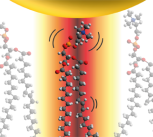
Submitted by Dr Nalin Patel on Mon, 18/08/2014 - 14:21
A new method which uses tightly confined light trapped between gold mirrors a billionth of a metre apart to watch molecules ‘dancing’ in real time could help researchers uncover many of the cell processes that are essential to all life, and how small changes to these processes can lead to diseases such as cancer or Alzheimer’s.
Researchers from the University of Cambridge, have demonstrated how to use light to view individual molecules bending and flexing as they move through a model cell membrane, in order to better understand the inner workings of cells. Details were published today in the journal Scientific Reports.
In order to view the behaviour of the cell membrane at the level of individual molecules, the Cambridge team, working with researchers from the University of Leeds, squeezed them into a tiny gap between the mirrored gold facets of a nanoparticle sitting just above a flat gold surface.
Analysing the colours of the light which is scattered by the mirrors allowed the different vibrations of each molecule to be seen within this intense optical field. “Probing such delicate biological samples with light allows us to watch these dancing molecules for hours without changing or destroying them,” said co-author and Winton Scholar Felix Benz. The molecules stand shoulder to shoulder like trees in a forest, while a few jitter around sideways.
The new insights from this work suggest ways to unveil processes which are essential to all life and understand how small changes to these processes can cause disease.
Further details can be found via this link.

